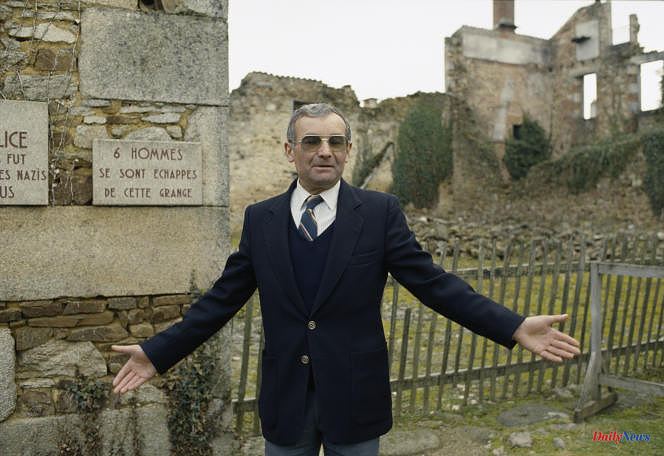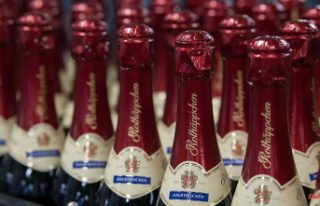Robert Hébras was born on June 29, 1925 in Oradour-sur-Glane (Haute-Vienne) and was the last survivor of the massacre which was perpetrated there on June 10, 1944 (643 dead including 260 minors, of whom 68 were under 6 years old) . He died on Saturday February 11 at the age of 97, announced in a press release his family, Philippe Lacroix, the mayor of Oradour-sur-Glane, and Benoît Sadry, president of the National Association of the Families of the Martyrs of Oradour-sur. - Glane.
Robert Hébras was 18 years old when the Der Führer regiment of the Das Reich Armored Panzer Division of the Waffen-SS invaded the town. The men were herded into the barns, the women and children into the church. For young Robert, it was the Laudy barn, with about sixty hostages, guarded by a detachment and two machine guns. After an hour of waiting, the shooting broke out. This was followed by the inspection of the mass grave to finish off the wounded with a pistol and set fire to the building. There were only six injured survivors, hidden under the pile of corpses.
The young apprentice mechanic, shot in the chest, one leg and one arm, managed to extricate himself and crawl out of the barn. He would have preferred, he explained later, to be shot down in a burst of fire rather than die tortured by fire. He managed to escape the rounds of the SS and reach a nearby hamlet. There he learned of the death of his mother and two of his sisters, Georgette and Denise, burned in the church. His father and his third sister, absent from the village that day, had escaped the massacre.
The survivor then won the maquis, then the army to take part in the battles for the Liberation. At the end of the war, he resumed his trade, opened his own garage, founded a family, had a son and then three grandchildren. It was then that he began the "memory work", which he would carry on all his life.
Survivor testimony
As a survivor, he testified at the trial before the Bordeaux military court, from January 12 to February 12, 1953, of twenty-three ex-SS (nine Germans and fourteen Alsatians). Two death sentences (including that of an Alsatian) were pronounced, a German was acquitted, the others being sentenced to hard labor for five to ten years. The following week, "for the sake of national cohesion", the Parliament voted an amnesty for the condemned Alsatians. This vote aroused two antagonistic rages, and a lasting dispute between Limousin and Alsace.
Robert Hébras was himself a victim. In 2012, the reissue of his book Oradour-sur-Glane, the hour-by-hour drama (Paths of Memory, 1992), in which he spoke of conscripts "so-called forcibly into SS units", led to a complaint from the Alsatian associations of escapees and conscripts. The Colmar Court of Appeal sentenced the author to 1 euro in damages for defamation and 10,000 euros in legal costs. On October 16, 2013, the Court of Cassation overturned the conviction on the grounds that these remarks "did not exceed the limits of freedom of expression". This did not spare him the vindictiveness of negationist historians, nor anonymous death threats.
At the same time, Robert Hébras had given himself a more ambitious objective than that of being a witness: to work for Franco-German reconciliation from the village, whose ruins preserved as they are are the busiest place in Limousin (300,000 visitors per year, according to the regional tourist office), in particular by German schoolchildren and students, for whom he was an attentive guide.
In 1983, he attended in East Berlin the trial and conviction (life imprisonment, release for health reasons in 1997) of one of the organizers of the massacre, Obersturmführer Heinz Barth, who was living under a false identity in GDR. He then returned several times to give lectures at German universities. Knight, then Officer of the Legion of Honor (2001), holder of the Austrian Holocaust Remembrance Prize (2008), of the Order of Merit of the Federal Republic of Germany (2012), he received the 4 September 2013 the President of the Federal Republic Joachim Gauck, accompanied by François Hollande. On June 10, 2017, he welcomed Emmanuel Macron on the occasion of the 73rd anniversary of the massacre.
He has published several books. In particular, in addition to Le Drame hour par hour (1992, Les Chemins de la mémoire), Before my voice goes out (with journalist Laurent Borderie, Elytel, 2014), he has participated in several documentary films, including Une Life with Oradour, by Patrick Séraudie (2011), and Der Fall Oradour, Investigating a War Crime, by Ute Casper (2014).












